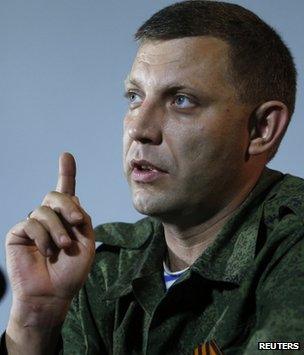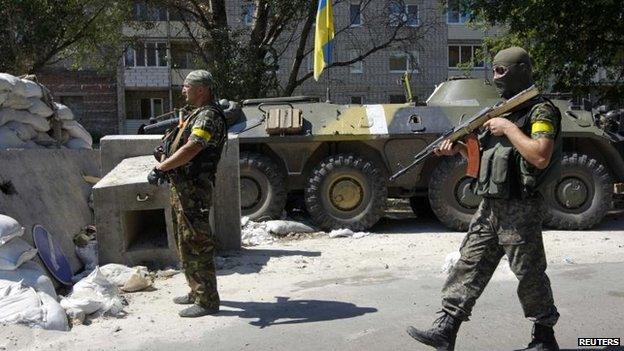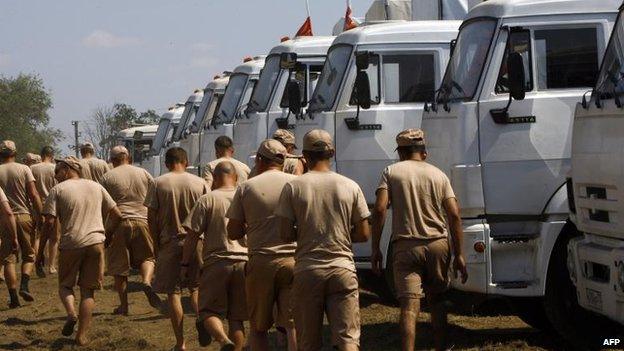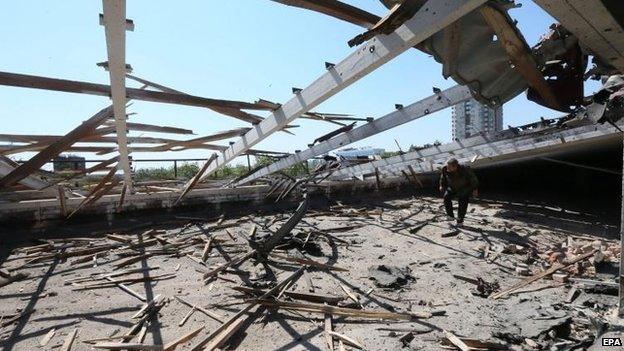Ukraine crisis: Rebel fighters 'trained in Russia'
- Published
There has been an increased level of military activity near the Ukrainian border, reports Steve Rosenberg
The new rebel leader in east Ukraine's Donetsk region has said his forces include 1,200 fighters who underwent military training in Russia.
Addressing a meeting, Alexander Zakharchenko said the fighters had trained "four months on the territory of the Russian Federation".
The rebels, he said, had reserves of 150 combat vehicles, including tanks.
An earlier mistranslation of his words suggested Mr Zakharchenko had said the vehicles were on their way from Russia.
Russia has denied claims by Ukraine and Western reporters that military aid to the rebels has been crossing the border.

Alexander Zakharchenko in Donetsk on Friday
More than 2,000 civilians and combatants have been killed since mid-April, when Ukraine's new government sent troops to put down an uprising by pro-Russian separatists in the Donetsk and Luhansk regions.
A huge humanitarian aid convoy from Russia is stalled on the Russian side of the border about two hours drive from Luhansk, apparently awaiting inspection by Ukrainian border guards.
Red Cross official Pascal Cuttat said on Saturday there were still no security guarantees in place for his staff to escort the lorries, although "technical conditions" had been agreed with Ukraine and Russia for crossing the border.
On Friday Russian Defence Minister Sergey Shoygu assured his US counterpart Chuck Hagel that there were no Russian military personnel involved with the convoy, nor would it be used as a pretext for a Russian military intervention.
Journalists who were invited to inspect some of the 280 or so vehicles on Friday found humanitarian aid inside but also noticed that some of the lorries were not full to capacity.
'Trained in Russia'
Mr Zakharchenko, who became the prime minister of the self-declared Donetsk People's Republic (DPR) last week, made the announcement to the rebels' parliament on Friday, with a video of his speech (in Russian), external posted on YouTube.
Littering the speech with military jargon, he said: "There are, at present, in the axis of the corridor [linking rebels in Donetsk with those in Luhansk and the Russian border] - there have been assembled -reserves of the following order: 150 units of military hardware of which about 30 are actual tanks and the rest are infantry fighting vehicles and armoured personnel carriers, and 1,200 personnel who underwent four months of military training on the territory of the Russian Federation."
The rebel leader went on a Russian pro-Kremlin TV channel on Saturday to reject reports that the hardware had come from Russia.
"The Ukrainian military have left us so much hardware that we can't find enough people to crew it - I mean tanks, troop carriers, Grad [multiple rocket] launchers and so on," he told Life News (video in Russian), external.
He added that "ethnic Ukrainian" volunteers from Russia, not servicemen, were fighting for the rebels, along with "Turks; a great many Serbs; Italians and Germans; and even two Romanians".

Ukrainian servicemen guard a checkpoint outside Donetsk

Russia insists the humanitarian aid convoy now parked near the border has no military personnel

A museum after shell damage in Donetsk
Ukraine said on Friday it had partially destroyed an armoured column that had crossed from Russia on Thursday evening. Two UK newspaper reporters witnessed the alleged incursion.
Russia's defence ministry responded by saying the incursion reports were "some kind of fantasy" and Moscow has consistently denied directly arming or training the rebels.
But the incident prompted a flurry of Western condemnation.
"Any unilateral military actions on the part of the Russian Federation in Ukraine under any pretext, including humanitarian, will be considered by the European Union as a blatant violation of international law," a statement by EU foreign ministers, external issued on Friday says.
German Chancellor Angela Merkel told Russian President Vladimir Putin in a phone call on Friday to "put an end to the flow of military goods, military advisers and armed personnel over the border".
.gif)